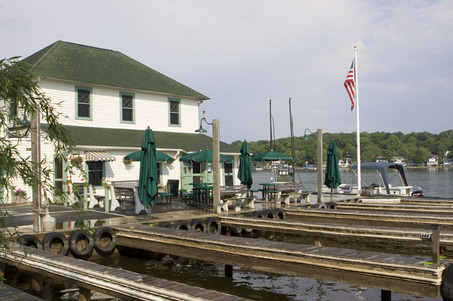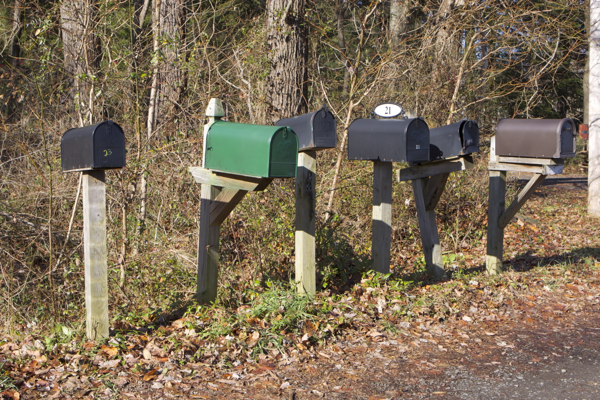DEP Dims the Lights on Clean Water
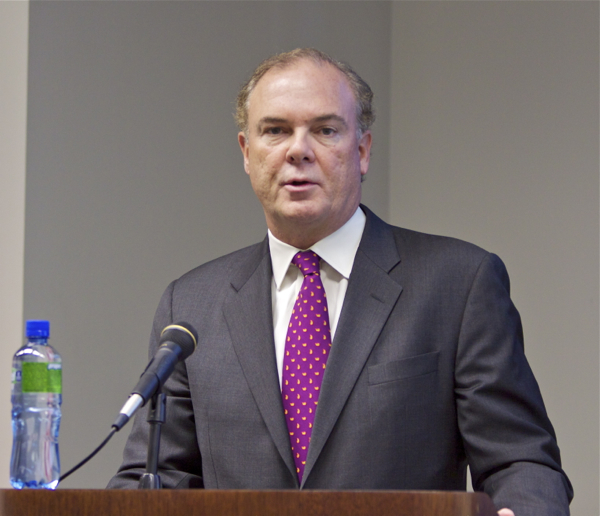
On Monday, NJ Spotlight held a policy roundtable on NJ water supply (see my prior post).
Today, considering similar multi-billion dollar water infrastructure deficits and financing issues, but in a very different format, the NJ Clean Water Council (“Council” or “CWC”) held its annual public hearing.
For water wonk insiders, the Council’s first ever joint meeting with the Water Supply Advisory Council (WSAC) was a quiet rebuff to DEP Commissioner Martin’s ill advised and failed recommendations to consolidate the North Jersey District Water Supply Commission and the New Jersey Water Supply Authority and combine the Clean Water and Water Supply Advisory Councils, pursuant to Governor Christie’ Executive Order #15.
The joint meeting with WSAC also served to shed light on DEP’s long delay in updating the Statewide Water Supply Master Plan, which the Chair of the Water Supply Advisory Council said would be “forthcoming shortly”.
Last year, the Council’s hearing focused on infrastructure deficits and asset management. At that hearing, I testified to urge the CWC to 1) oppose Martin’s EO 15 recommendations to consolidate; 2) to recommend regulatory mandates for asset management; and 3) to recognize the public health significance of so called “end of pipe” regulatory mandates, not disparage them (see hearing transcript at page 42, line 15).
So while I was pleased to see issues #2 and 3 of my testimony last year reflected in the Council’s 2010 recommendations to Commissioner Martin, I was disappointed that the topic for this year’s 2011 hearing – which was set by Commissioner Martin – was a repeat of last year’s hearing: Infrastructure Asset Management.
Despite Martin’s direction to the Council to recycle the infrastructure issue, Martin failed to include infrastructure as a priority in his recently issued 2010 DEP vision and priorities document.
Martin has directed his DEP staff to “do less with less“; to focus on his “transformation” and “core mission” priorities; and to identify and eliminate non-core or redundant functions.
While ignoring infrastructure financing, those (warped) priorities do include:
- adherence to “customer service principles”;
- streamlining permitting;
- privatization and outsourcing;
- expanded access for regulated entities in permitting;
- elimination of the landscape project habitat map in DEP regulatory programs
In response to Martin’s directives, DEP staff have told me that DEP Mangers have told them that if an environmental program or regulatory function are not included as a Martin priority, then they will not do that work – regardless of statutory and/or regulatory mandates requiring them to do so.
But enough of Martin’s mismanagement, let’s get back to today’s Clean Water Council hearing.
As mandated by the Legislature, the Council holds an annual public hearing, to provide an opportunity for the public to weigh in on clean water priorities.
Typically, the Council, in consultation with the DEP Commissioner, selects a single topic to focus on, and invites expert panelists to make presentations on it.
The expert presentations and public testimony are considering by the Council, who then issue a set of recommendations to the DEP Commissioner.
In the last five years – ignoring many other pressing water issues – the Council has held 4 hearings on the infrastructure issue (2007, 2008, 2010, 2011).
Yet, DEP has failed to follow through and implement the Council’s recommendations.
For example, last year’s Council recommendations, conveyed in a November 17, 2010 letter to Martin, included the need for DEP to adopt regulations (boldface mine):
Ensuring Effective Asset Management
All utilities should be required to establish and practice asset management. Asset management should include three general elements:
- a means of routine asset condition assessment;
- a programmed and preventive maintenance (PPM) system; and
- a procedure for evaluating the life-cycle cost impacts of repair or replacement decisions.
Any State regulations adopted to require the implementation of these general elements should not mandate specific methods or thresholds across all utility types and sizes unless they are recognized industry standards. Fair, reasonable and consistent regulations are needed. NJDEP should regulate water supply utilities regarding leakage control and water accounting to ensure effective water resource management, to limit system leakage and to allow for proper baseline water auditing. Similar threshold-based indicators are needed for wastewater (e.g., infiltration and inflow, sanitary and combined sewer overflows) and stormwater infrastructure. Based on the regulatory benchmarks, NJDEP should assess utility success regarding maintenance of physical utility assets that are critical to the protection of environmental quality and public health and safety, and make the results available to the public. … […] …
NJDEP should identify and apply the most critical and useful threshold-based infrastructure and environmental indicators, using cost-effective methods for monitoring utility status. NJDEP should then use existing regulatory provisions of its NJPDES and Safe Drinking Water Programs to ensure use of these indicators and implementation of proper asset management by wastewater utilities, municipal stormwater systems and water supply utilities.
Yet DEP has done nothing to implement last year’s Council recommendations.
And today, we heard only rhetoric from Commissioner Martin, who stated that DEP “was developing an Asset Management Strategy”.
DEP should be proposing rules by now!
There were too many interesting things said today to rehash here, so, for those interested in the details, I will post a link to the hearing transcript when it is made available by DEP.
Other than myself and Jeff Tittel of Sierra Club (who delivered a tour de force on NJ’s longstanding serious water problems), the environmental community and the press corps were AWOL.
That is a shame, because this is an annual event to weigh in on clean water issues.
The NJ Environmental Federation, who sits on the Council and ostensibly represents environmental and public health interests, did not even testify and their rep arrived 40 minutes late (missing their friend Commissioner Martin’s remarks).
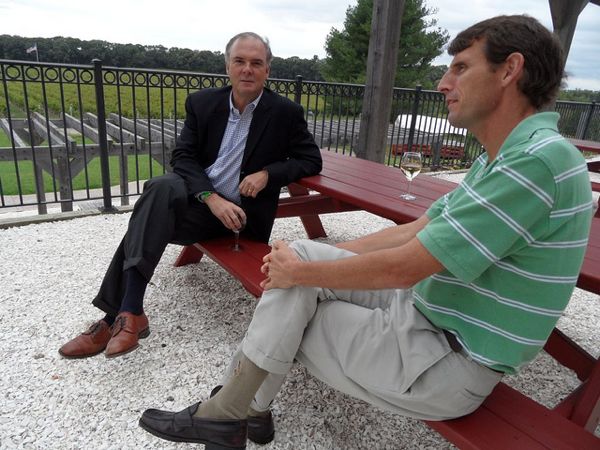
Dave Pringle, NJEF (R) shares deep thoughts with DEP Commissioner Bob Martin (L).
[Note: a reader who wishes to remain anonymous writes that “NJEF is the NJ affiliate of the national DC based group Clean Water Action (CWA). As the CWA affiliate, this should be their big issue/ big event – instead they are an embarrassment to CWA”]
I did not come prepared with written testimony, but did make a few extemporaneous remarks along the following lines:
1) regulatory mandates have been a success and should not be disparaged by slogans – we need more regulations and more enforcement.
2) I complimented the presentation by Dennis Doll, the President of Middlesex Water Company, who refreshingly highlighted the key barriers to progress: money, politics, and leadership.
Doll said, several times, that professionals seeking prudent solutions often go against the political grain, and do so at tremendous personal and career risk.
So, I advised the audience, composed mostly of water resource professionals, that PEER’s job is to defend scientific integrity and the front line professionals, who should never have to suffer career harm or retaliation for doing the right thing.
I urged anyone subject to that kind of pressure to contact me anonymously and with total confidentiality.
3) Governor Christie’s Strategic Economic Development Plan and EO 78 require that State agencies conform their functional plans to the State Plan.
This represents a threat to DEP functional plans mandated by statute, including the Water Supply Master Plan and the Water Quality Management Plan. I urged the Council to consider and make recommendations on these issues.
4) Mr. Doll also emphasized the need for leadership and building credibility to secure public confidence and support.
I completely agreed with that.
I then said that Governor Christie’s failed leadership, including his demagogic attacks on local authorities and public employees, along with his ideological opposition to government, taxes/fees or revenues, and regulatory intervention, were serious problems and exactly the opposite of the kind of leadership we need.
I urged the professionals in the room to address those issues head on and generate some pushback to the Governor.
5) In response to statements by Dean Noll that local governments were illegally diverting infrastructure money to other purposes, I urged the professional aware of those situations to blow the whistle: name names!
More to follow. In the meantime:
Turn on the bright lights,
Turn on the bright lights,
What a fool I have been.
I believed
I believed that you loved me
But I was sure taken in. ~~~ “Turn on the bright lights” (Jerry Garcia – 1974)
[Update 12/1/11 – wanted to include a few more points:
I) A Kinder, gentler, less greedy NJBIA?
NJBIA testified and took a different approach to paying for water than they are taking on paying for energy (which is: reduce our costs now, the public and the future be damned!).
Sarah Blum of NJBIA was on her best behavior, and meekly asked the Council and or DEP to estimate the costs on ratepayers, so that businesses could plan to include them in the cost of doing business!
But, if you listened closely, she still held out the threat by dropping the “R” word: recession (translation: don’t dare raise our costs in a recession).
II) Ironic history
Back in 2005, when there was no buzz on infrastructure financing and asset management, I testified to the Council as follows: (transcript at page 112 – 113):
-
that's the first fundamental point I think I made in terms of imploring the Council to -
recommend to the incoming administration the need to grapple with the money question and to come up with some stable source of funding to deal with the clean water issues in the state.
Testimony to the Clean Water Council October 31, 2005
Bill Wolfe, Director NJ PEER
A public investment strategy and regulatory agenda to protect public health, quality of life, drinking water and preserve remaining high quality streams, lakes, rivers, wetlands, forests, & farms.
Need for Public Investment – Financing environmental infrastructure deficits
The first priority of the Clean Water Council should be a strong recommendation to the next Administration to get the environmental infrastructure deficit issue on the political and policy radar screens. The Council should focus on the fact that environmental infrastructure deficits are a serious and long ignored problem that threaten NJ’s economic future, quality of life, public health, and ecological integrity. The Council needs to emphasize that water resource and environmental infrastructure expenditures are investments. The Council should recommend the absolute need to establish creative new funding sources to finance this critical deficit.
III) Empty suits and Empty chairs
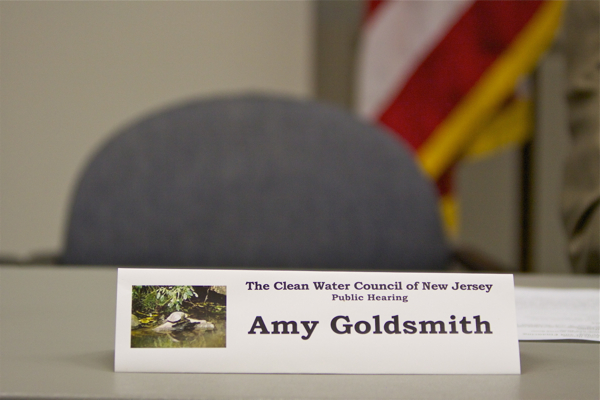
Shared organizational traits – it’s not just Pringle

 An audience member posed a question to the panel about what the profit rate was for the water companies. After a moment of uncomfortable silence, Solomon jumped in and proceeded to spend 15 minutes defending Wall Street investor interests. He explained why Wall Street investors needed to receive at least a 10% guaranteed return on investment (comparing that to the fact that average people earn a paltry 1% or less on bank deposits).
An audience member posed a question to the panel about what the profit rate was for the water companies. After a moment of uncomfortable silence, Solomon jumped in and proceeded to spend 15 minutes defending Wall Street investor interests. He explained why Wall Street investors needed to receive at least a 10% guaranteed return on investment (comparing that to the fact that average people earn a paltry 1% or less on bank deposits).
